




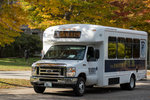
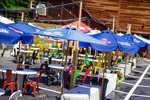
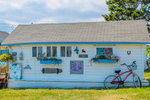
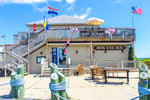
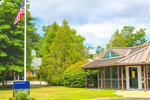
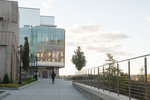
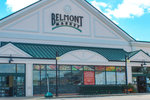
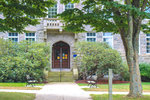

To go or not to go, that is the question. From nursery schools to colleges and universities, communities are trying to come together to make the right decisions for both public health and the economy.
South County is grappling not only with public schools but also with the reopening of its institute of higher education and hub of social activity, the University of Rhode Island. The region enjoys a flip-the-switch economy – as soon as the tourists depart on Labor Day, the students descend and stay until tourism starts up again. It’s created a unique economic model that is great for year-round stability of bars and restaurants, supermarkets and liquor stores, summer-home owners who can rent their properties to students during the school year, and so on.
“Not only will a decrease in the student body have an impact locally,” says Louise Bishop, President and CEO of South County Tourism. “URI brings in a lot of sports-related and group business that pay for hotel rooms and meals. So tax revenue to the community will be reduced. In this situation, one issue leads to the next.”
URI boasts a student body of almost 20,000, and according to Vice President of Student Affairs, Kathy Collins, Ph.D., received more applications this year than ever before. But how will the presence of COVID-19 impact this clustered community? What if the pandemic keeps students away who choose to commute back to Coventry or Providence or stay in Warwick taking classes online? How will having more students living off campus impact the university, the local economy, and public safety?
URI has a comprehensive plan in place to, hopefully, prevent any kind of negative impacts beyond its bounds. According to Collins, dorm capacity has been reduced to 4,600 from 6,000 and each resident student will be tested before move-in day. Classroom capacity is being reduced so that each student has 36-square feet of space. More classes are being offered in online or hybrid format. Dining halls will be take-and-go, masks will be required, sanitizing will be constant, and so on. There will be a new rule book, literally, and penalties will be assessed by Campus Police on students who break the rules by, say, throwing a frat party, according to Collins. But the country has witnessed collegiates flagrantly ignore social distancing rules on beaches and elsewhere, so controlling the behavior of 18- to 21-year-olds sounds a little like herding cats.
It’s that flip-the-switch model that provides the URI student community with living arrangements that might be more beneficial than living on campus…or less, depending on how compliant they choose to be with social distancing protocol. Living in a Narragansett or South Kingstown rental for the school year might be that middle-of-the-road option that works for some students: Not commuting from home, but not living on campus. This is one segment of the local economy that is helped, not hurt, by coronavirus.
“Well, there has been a lot of drama,” begins Jim Durkin, owner of Durkin Cottage Realty in Narragansett. For more than half a century, Durkin has been the go-to rental agency for URI students looking to live “down the line” (Rhody Rams-speak for “in a beach house”). Back in March, when COVID-19 shut down the campus along with the rest of the world, Durkin’s phone started ringing. Some students were headed home for the rest of the school year and parents were looking for rent refunds. Durkin was flexible. It was, after all, a global pandemic.
And then, not long after the spring wave broke, the phones started ringing again – parents and students feeling like a rental was the best option for the fall semester. “I’m trying to go easier in terms of payments and requirements,” Durkin says. “But we won’t feel a negative impact from this. We are not seeing a decrease in rentals. I have maybe two availabilities as of now.”
Henry Leclaire is one of those students who is opting to live down the line. A resident of Warwick, Leclaire graduated from Bishop Hendricken in May and, like every other high school senior in America, missed out on the celebration. And now, so too will his freshman year at URI look different. Leclaire and several of his friends will live in a family-owned beach house in South County instead of in the dorms. “I feel bad he’s not getting that typical college experience he hoped for, but I think it’s best this way,” says his mom, Amy Leclaire.
But are students willing to abide by social distancing rules in their efforts to celebrate the new semester? Peter Garafalo is skeptical. Garafalo is the general manager of the Bon Vue Inn, a bar and restaurant overlooking the beach in Narragansett that has been popular with URI students for decades. Is Garafalo concerned fewer students matriculating in the community will hurt his bottom line more than COVID-19 has already? “In the past,” he says, “we’d depend on URI students a couple of nights a week when we’d have music and dancing. But that’s not going to be possible for the foreseeable future. They’re not going to want to come here in masks and stay six feet apart. They’re looking for a party.” Instead, Garafalo adds, the Vue will continue to rely on a very loyal group of regular locals.
Closer to campus, at the popular Mews Tavern in Wakefield, things are looking a little different. “We’re definitely concerned if the student population is significantly decreased,” says business manager George McAuliffe. “But we don’t focus just on the students. From parents visiting campus to athletic and alumni events, to parents’ weekend and homecoming, cancelled or smaller events will have an impact,” he says. “What that will be, we just can’t predict.”
Both Garafalo and McAuliffe suspect the influx of as many as 5,000 students into the beach house communities, coupled with the dearth of public gathering spaces, will cause serious headaches for local police forces. “They are all about the house parties,” says Garafalo, “not a bar that is at 66 percent capacity that has to close at 11pm.”
Narragansett and South Kingstown police departments have a long-standing relationship with students who live in the beach communities. Traditionally, there will be a rash of house parties, especially at the beginning and end of the semesters, but for the most part police take a safety-first but measured approach with students, asking them to quiet down or issuing a nuisance citation. But with strict state regulations in place (no more that 15 people gathered in one place at a time, masks required) and a hospital system that has seen enough stress, the stakes will be much higher this year to try to get students to comply with the uncomfortable and unusual circumstances of COVID-19.
Susan Hoopes, the marketing director at the upscale Belmont Market in Wakefield, thinks it’s all about adaptation and doing our part. One day in late July, Hoopes took a call from a concerned mother of a returning URI student. Her son didn’t have a car, she explained, and in semesters past would hitch rides to the supermarket with friends. She wanted to know if Belmont offered delivery options.
Belmont already had some local delivery, so Hoopes decided to reach out to URI to see if the University could create a protocol whereby Belmont could deliver to dorms, despite the fact that the market was already bursting at the seams. (“It’s like the Fourth of July every day in here,” Hoopes says.) “But what are you going to do? You look for opportunities to grow and expand and help your customer base. You just have to say, ‘We’ll figure this out together.’”
Other items that may interest you





Comments
No comments on this item Please log in to comment by clicking here